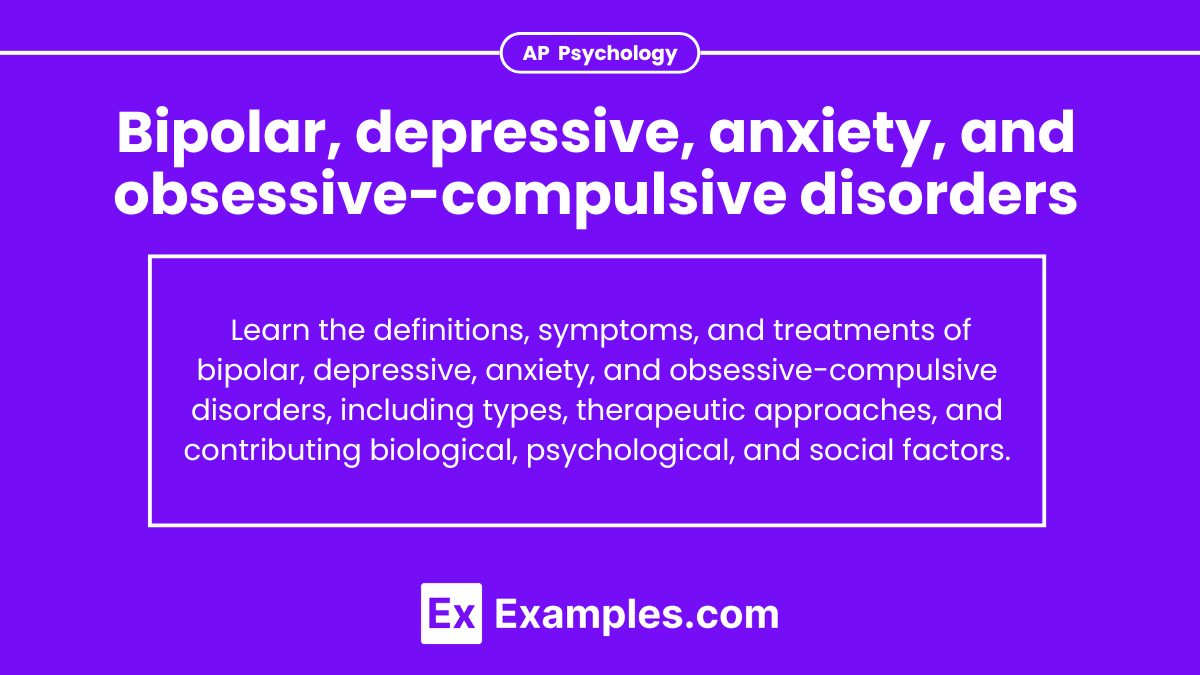Understanding bipolar, depressive, anxiety, and obsessive-compulsive disorders is crucial for students preparing for the AP Psychology exam. These mental health conditions, characterized by mood swings, persistent sadness, excessive worry, and repetitive behaviors, significantly impact individuals' daily lives. Knowledge of these disorders includes their definitions, symptoms, and treatment methods, which encompass medications and therapies. Grasping these concepts aids in recognizing the biological, psychological, and social influences on mental health, providing a comprehensive foundation for the exam.
Learning Objectives
Learn the definitions, symptoms, and treatments of bipolar, depressive, anxiety, and obsessive-compulsive disorders. Focus on differentiating between the types of each disorder (e.g., Bipolar I vs. Bipolar II), recognizing the clinical symptoms, and knowing the therapeutic approaches, including medications and cognitive-behavioral therapies. Also, grasp the biological, psychological, and social factors contributing to these disorders and how they impact daily functioning and overall mental health.
Bipolar Disorder

Bipolar disorder, formerly known as manic-depressive illness, is a mental health condition characterized by extreme mood swings that include emotional highs (mania or hypomania) and lows (depression).
Types
Bipolar I Disorder: Defined by manic episodes lasting at least seven days or by manic symptoms that are so severe that immediate hospital care is needed. Depressive episodes occur as well, typically lasting at least two weeks.
Bipolar II Disorder: Characterized by a pattern of depressive episodes and hypomanic episodes, but not the full-blown manic episodes that are typical of Bipolar I Disorder.
Cyclothymic Disorder: Periods of hypomanic symptoms as well as periods of depressive symptoms lasting for at least two years (one year in children and adolescents), but the symptoms do not meet the diagnostic requirements for a hypomanic episode and a depressive episode.
Symptoms
Mania/Hypomania:
Elevated or irritable mood
Increased activity or energy
Inflated self-esteem or grandiosity
Decreased need for sleep
Talkativeness
Racing thoughts
Distractibility
Increased involvement in risky activities
Depression:
Depressed mood
Loss of interest or pleasure
Significant weight loss or gain
Insomnia or hypersomnia
Psychomotor agitation or retardation
Fatigue or loss of energy
Feelings of worthlessness or guilt
Diminished ability to think or concentrate
Recurrent thoughts of death or suicide
Treatment
Medications: Mood stabilizers (lithium), antipsychotics, and antidepressants.
Therapy: Cognitive-behavioral therapy (CBT), psychoeducation, and family therapy.
Lifestyle: Regular routine, healthy diet, exercise, and avoiding alcohol or drugs.
Depressive Disorders
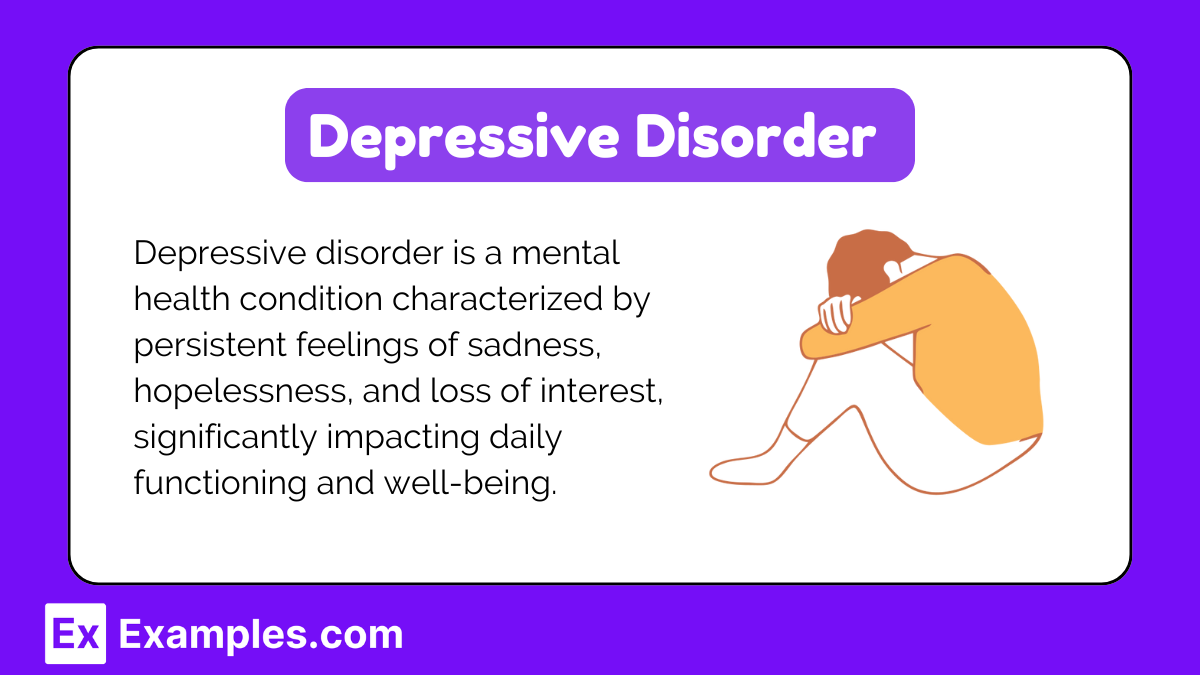
Major Depressive Disorder (MDD)
Major Depressive Disorder is characterized by a persistent feeling of sadness or a lack of interest in outside stimuli.
Symptoms
Depressed mood most of the day, nearly every day
Markedly diminished interest or pleasure in all, or almost all, activities
Significant weight loss when not dieting, weight gain, or decrease/increase in appetite
Insomnia or hypersomnia
Psychomotor agitation or retardation
Fatigue or loss of energy
Feelings of worthlessness or excessive guilt
Diminished ability to Critical Thinking or concentrate
Recurrent thoughts of death or suicide
Persistent Depressive Disorder (Dysthymia)
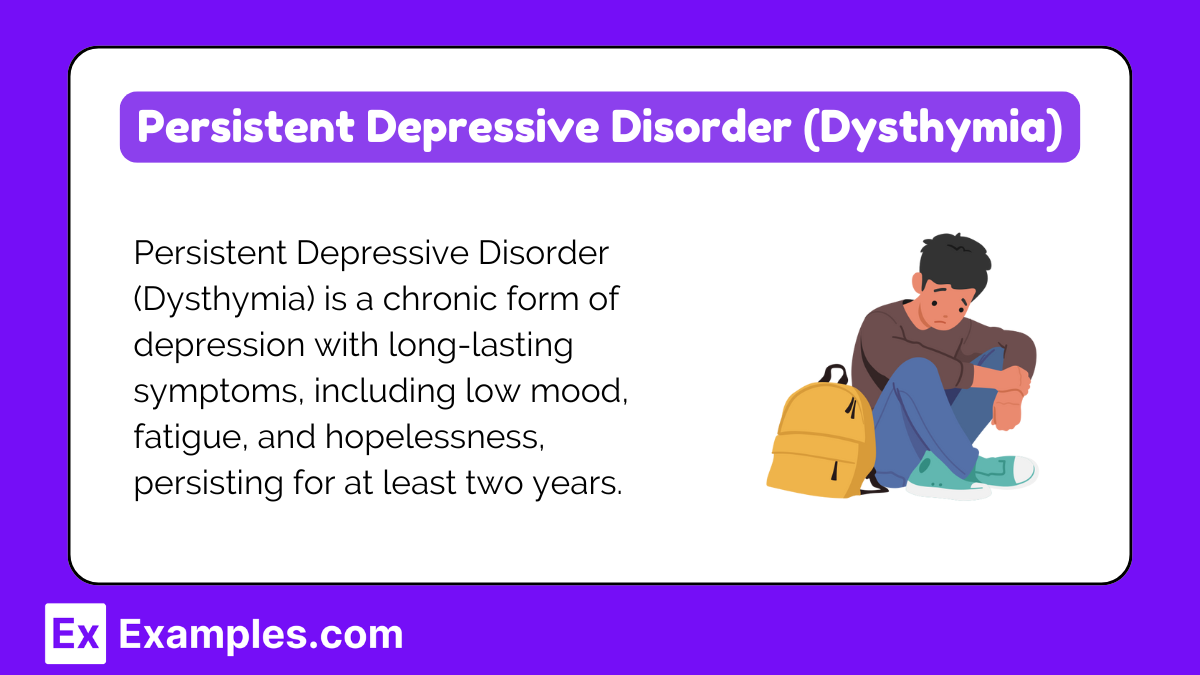
A chronic form of depression where a person’s mood is regularly low, but symptoms are not as severe as those of major depression.
Symptoms
Poor appetite or overeating
Insomnia or hypersomnia
Low energy or fatigue
Low self-esteem
Poor concentration or difficulty Decision Criteria
Feelings of hopelessness
Treatment
Medications: Antidepressants (SSRIs, SNRIs, tricyclics, MAOIs).
Therapy: Cognitive-behavioral therapy (CBT), interpersonal therapy (IPT).
Lifestyle: Regular exercise, balanced diet, good sleep hygiene, mindfulness practices.
Anxiety Disorders
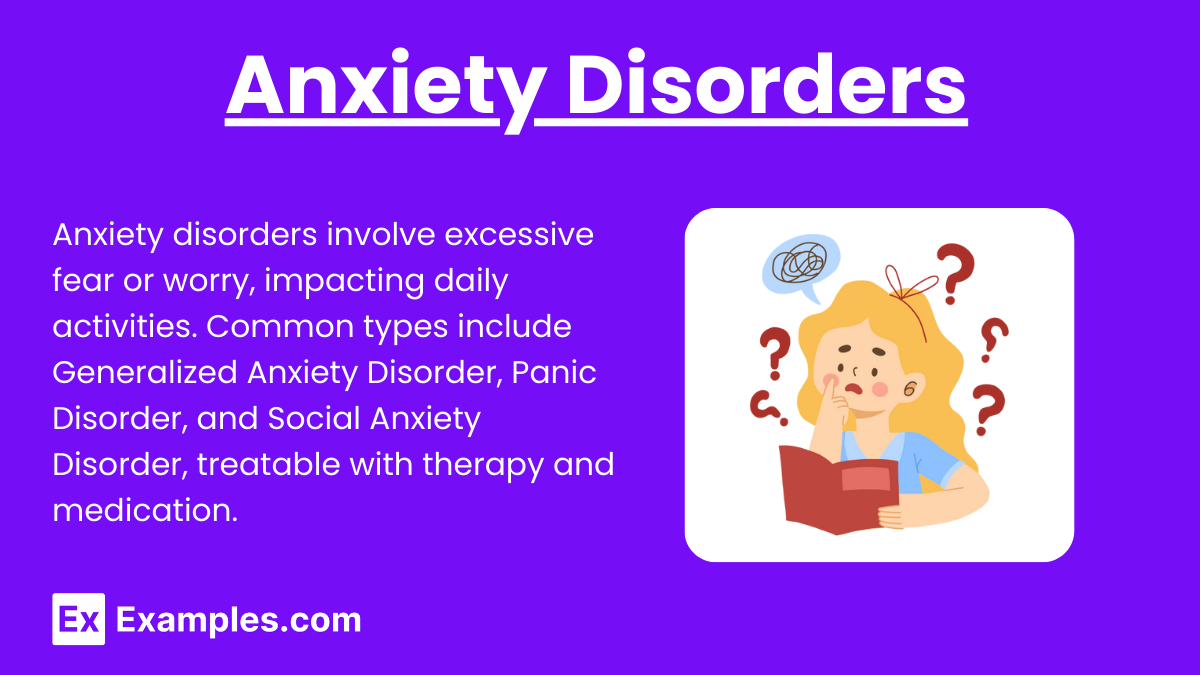
Generalized Anxiety Disorder involves excessive, uncontrollable worry about various aspects of life.
Symptoms
Restlessness or feeling keyed up or on edge
Being easily fatigued
Difficulty concentrating or mind going blank
Irritability
Muscle tension
Sleep disturbance
Panic Disorder

Characterized by recurrent unexpected panic attacks—sudden periods of intense fear or discomfort.
Symptoms
Palpitations, pounding heart, or accelerated heart rate
Sweating
Trembling or shaking
Sensations of shortness of Breathing or smothering
Feelings of choking
Chest pain or discomfort
Nausea or abdominal distress
Feeling dizzy, unsteady, lightheaded, or faint
Chills or heat sensations
Paresthesias (numbness or tingling sensations)
Derealization or depersonalization
Fear of losing control or "going crazy"
Fear of dying
Social Anxiety Disorder
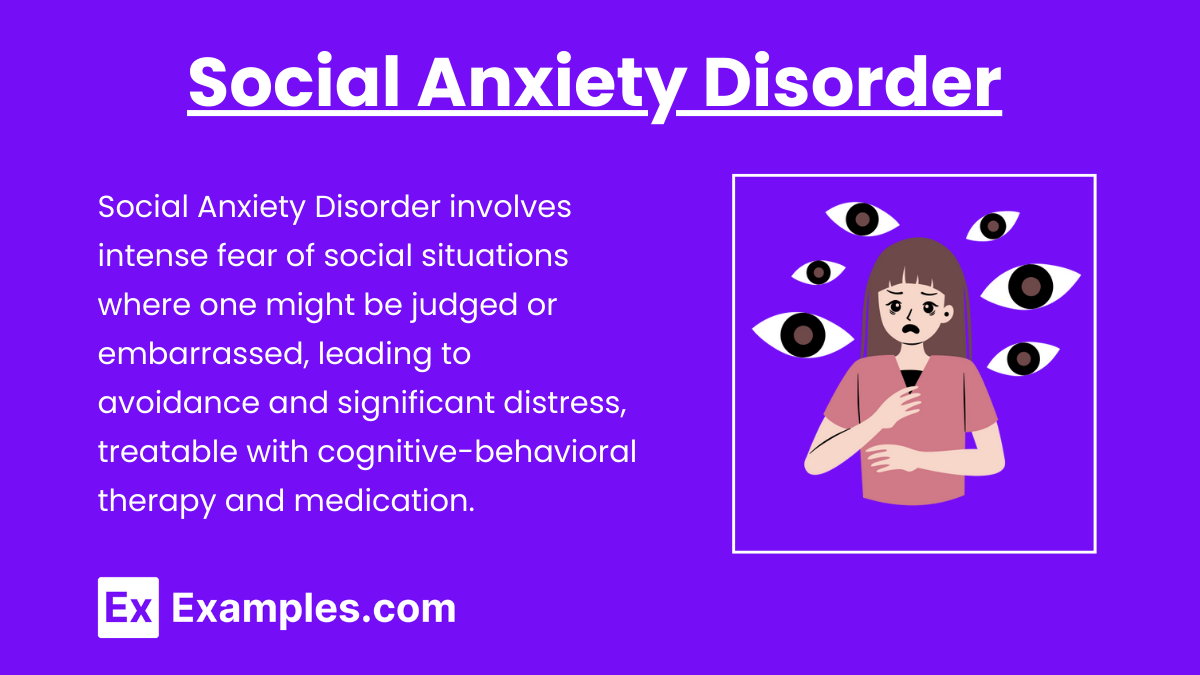
Social Anxiety Disorder involves significant anxiety and discomfort about being embarrassed, humiliated, rejected, or looked down on in Social Communication.
Symptoms
Intense fear of interacting with strangers
Fear of situations where you may be judged
Worrying about embarrassing or humiliating yourself
Avoidance of social situations
Intense fear of being observed by others
Treatment
Medications: SSRIs, SNRIs, benzodiazepines.
Therapy: Cognitive-behavioral therapy (CBT), exposure therapy.
Lifestyle: Stress management techniques, regular Physical Health, adequate sleep, mindfulness and relaxation techniques.
Obsessive-Compulsive Disorder (OCD)
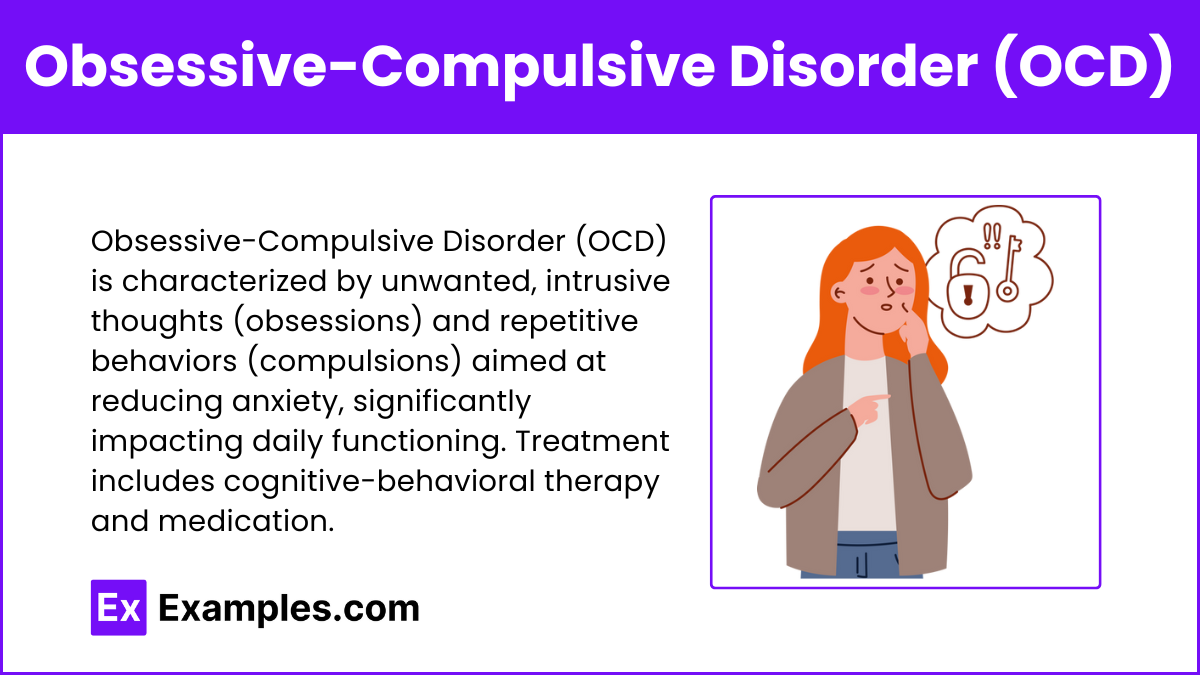
OCD is characterized by unwanted and intrusive thoughts (obsessions) that trigger distressing feelings, often followed by repetitive behaviors (compulsions) aimed at reducing the distress.
Symptoms
Obsessions:
Fear of contamination
Unwanted forbidden or taboo thoughts involving sex, religion, and harm
Aggressive thoughts towards others or self
Having things symmetrical or in a perfect order
Compulsions:
Excessive cleaning or handwashing can be addressed effectively with a comprehensive cleaning service proposal tailored to individual needs.
Ordering and arranging things in a particular, precise way
Repeatedly checking on things, such as ensuring that the door is locked or the oven is off
Compulsive counting
Treatment
Medications: SSRIs, clomipramine.
Therapy: Cognitive-behavioral therapy (CBT), particularly exposure and response prevention (ERP).
Lifestyle: Stress reduction techniques, maintaining a structured routine, support groups.

